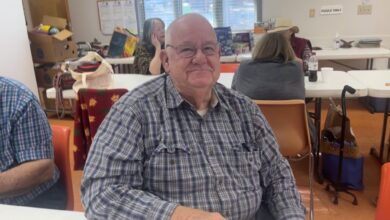Saving hearts — and farmworker lives — in the fields


By Anne Blythe
The growing season for many eastern North Carolina crops might be fallow right now, but that hasn’t stopped Margaret Sharp, a community impact director for the American Heart Association, and others from cultivating the seeds of a new healthcare program for farmworkers.
Sharp, a Wayne County resident for the past decade, is a trained nurse with a passion for community and public health.
When she started her job as a community impact director for the heart association in August 2023, she engaged in a listening tour of sorts for a multi-county rural region that extends from Wayne County east to the coast and north to the Virginia border.
Through word of mouth, she heard about the death of seven farmworkers that year. It had been a summer of prolonged, record-breaking heat, with extremes that made working in the fields dangerous and preventing rest and recovery in living in quarters that didn’t measurably cool down at night difficult.
One death last year prompted an investigation by the North Carolina Department of Labor and calls for new laws to protect workers from extreme heat in agricultural fields and other industries.
José Arturo Gónzalez Mendoza, a 30-year-old farmworker from Guanajuato, Mexico, died Sept. 5, 2023, after harvesting sweet potatoes from a Barnes Farming field in Nash County — less than two weeks after starting the job.
Temperatures that week had climbed into the 90s, according to Accuweather. Extreme heat can lead to heat stroke and cardiovascular events.
“There was a real interest from both the farmworkers and the growers in wanting to know more about CPR,” Sharp told NC Health News in a recent interview.
The American Heart Association in eastern North Carolina and Access East, a nonprofit organization affiliated with the ECU Health system, created pilot programs with cardiopulmonary resuscitation and other health care training for growers and farmworkers.
Difference between life and death
Juan Allen, a community coordinator with Access East and an Affordable Care Act navigator who helps farmworkers on temporary work visas get low-cost insurance, has played an instrumental role in getting 5,000 people trained in CPR this year.
“Juan Allen is amazing,” Sharp said Sept. 11 during a meeting of LATIN-19, an organization founded by Duke Health professionals. The group highlights systemic health care access issues that affect North Carolina’s Latino community.
Allen has helped train 5,000 people in hands only CPR since the pilot program began distributing kits this year. Ninety percent of those who received the training were farmworkers and the other 10 percent were growers.
Giving growers and farmworkers the skills to provide CPR to someone experiencing a cardiac event in the fields or housing quarters on the farm can sometimes mean the difference between life and death.
In a severe emergency, quick access to health care is crucial and often hospitals, clinics and doctors offices can be many miles away from a remote rural farm.
The Access East Farmworker Program also helps teach farmworkers about the signs of heat exhaustion and heat stroke. They educate workers on skin cancer risks and detection, how to stop bleeding, and how to recognize signs of an opioid overdose and when to administer naloxone (which goes by the brand name Narcan) to reverse the effects.
Allen told NC Health News he likes to work with some of the smaller growers.
“We started this because during the COVID time we were working with the farms to get vaccines,” Allen said.
Farmworkers and growers told Allen they wanted to learn how they could help their peers in the fields after seeing some succumb to the heat and cardiac events. “The heat, they are used to because they come from places where there is heat, but not the humid heat,” Allen added.
The general health of the work crews can be wide-ranging. Some workers are as young as 18 and others can be as old as 50. The feedback about the CPR training and other educational programs has been positive so far. Allen heard recently from a couple of farmworkers that they had used what they learned in the fields.
“They feel very encouraged,” Allen said, “They feel they are prepared.”
Encouraging prevention
Another project that excites Sharp is one being done in partnership with Salud Sin Fronteras, a nonprofit started by Angelica Santibañez-Mendez, after working as a nurse in a Federally Qualified Health Center clinic with farmworkers.
“We were doing some pilots with them for providing both blood pressure cuffs and also blood glucose monitors,” Sharp said.
Sometimes workers don’t want to be identified as having health issues for fear they might lose their job or have difficulty getting hired elsewhere during a different growing season.
To try to normalize blood pressure checks and glucose monitoring, the project created competitions for the farmworkers to see who could get their blood pressure the lowest. Such competitions, Sharp said, provide outreach workers an opportunity to follow up and get farmworkers to local clinics if they need to be seen and treated for health problems.
Agriculture is a $100 billion dollar a year industry in North Carolina, according to the North Carolina Farmworker Health Program housed in the state Department of Health and Human Services.
It’s also one of the most dangerous occupations, DHHS adds, not only because of the numerous health risks inherent in farming but also because transportation, language, cost and isolation issues often pose barriers to health care.
New tool on the way
Sharp said she received grant funds to place automated external defibrillators, or AEDs, at some farmworker camps. These AEDs will include trackers, making it easier for emergency workers to find people in need of assistance in remote areas.
That project is expected to kick off next year when the growing season starts again.
“I’m really excited about that,” Allen said.
Often, farmworkers in the state on temporary visas are sent to fields to harvest crops in fields off of rural roads with names that are unfamiliar. The AEDs are portable — about the size of a laptop — and can be moved between the bunkhouses and fields.
Part of the training is to get migrant workers more familiar with the 911 system and to let undocumented immigrants hesitant to seek help for fear of deportation know what to expect.
“They’re explaining that they’re not going to ask you anything other than where you are and what your emergency is,” Sharp said.
“We’ll also let them know ‘the AED is not for EMS, it’s there for you,’” Sharp said. “‘It’s in a cabinet that’s unlocked. An alarm may go off, but that’s to alert other people to help you.’”
As the growing season returns, Sharp, Allen and others hope the pilot programs will blossom again with a healthy crop.
The post Saving hearts — and farmworker lives — in the fields appeared first on North Carolina Health News.









